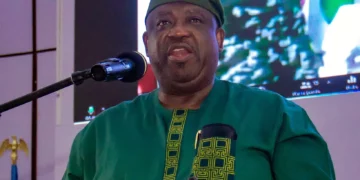The Coalition of Northern Groups (CNG) expressed deep concern about the ongoing power outage that has paralysed parts of Northern Nigeria over the past five days.
In a statement by the national coordinator, CNG, Comrade Jamilu Aliyu Charanchi, yesterday, said that this unprecedented blackout has thrown millions of households into darkness and crippled businesses.
He said the group reliably gathered that patients are already dying at various hospitals due to the inability of the hospitals to supply alternative means of power to utilise oxygen to save the lives of the patients in severe and critical conditions.
“Preliminary findings by the CNG indicate that this outage is the direct result of vandalism on the second Shiroro power line, which feeds the crucial Kaduna Station that distributes to other states in the North. We also learned that the first other line had been faulty for months. Yet, no effort to fix it could have saved the current avoidable situation.
“We are particularly disheartened to learn that two towers along this line have not received serious attention at the beginning of the problem to restore power promptly. Furthermore, the only alternative source of supply, the Jos line, has repeatedly tripped, which the TCN currently said is working to fix but cannot bring about a lasting solution. The current state of affairs is unacceptable and deeply alarming,” he said.
On the lack of transmission capacity for the North West and North East, he said the CNG, after engaging with experts, learnt that there is also a significant infrastructural gap as there is no transmission system to carry sufficient power to the North West and North East regions. He said this was despite establishing the Transmission Rehabilitation and Expansion Programme (TREP), aimed at creating flexibility in transmission with a budget of $1.661 billion, alleging that mismanagement has hindered its progress.
“Additionally, over $500 million in savings, intended to support the Eastern Backbone transmission project—which would have connected vital areas such as Sokoto, Kaura Namoda, Katsina, and beyond—has been mismanaged, further delaying essential connectivity.
“With the destruction of the two 330kV single circuit (SC) lines between Shiroro and Kaduna, only one single circuit from Jos to Kaduna now supplies the entire North West. Similarly, the North East depends on a single circuit line, the Jos-Gombe 330kV, meaning both regions face severe limitations in power transmission infrastructure,” he said.
He also alleged a ‘severe power allocation imbalance’ in the country. He observed that the North, which accounts for a significant portion of Nigeria’s population and economic activity, is shamefully underserved regarding electricity infrastructure and distribution. He said the region relies on only two 330kV lines. At the same time, Lagos benefits from eight power lines alone. He added that this disparity reflects a pattern of long-standing neglect and imbalance in national power infrastructure investment.
“In addition, the current DisCo Load Allocation is alarmingly skewed. DisCos operating across the North—including Jos (60 MW), Kaduna (50 MW), Kano (20 MW), and Yola (30 MW)—receive only 160 MW out of the existing 4,249 MW capacity. In stark contrast, Lagos’s Eko and Ikeja DisCos cumulatively receive about 1,400 MW, while Ibadan, Benin, Enugu, and Port Harcourt also benefit from significantly higher allocations. This allocation imbalance not only limits the North’s development potential but also reveals a pattern of systematic neglect,” the statement reads.
Therefore, the CNG calls on the Federal Government, the Transmission Company of Nigeria (TCN), northern governors, lawmakers, and all relevant stakeholders to immediately expedite efforts to restore power to the North. It says this unacceptable outage must be treated with the urgency it deserves.
It also demands a comprehensive review of the current electricity distribution framework to ensure fair and equitable access to power across all regions of the country. “We call on the FG, TCN, and Nigerian Electricity Regulatory Commission (NERC) to explain the rationale behind this lopsided allocation, given that the North is home to most of Nigeria’s hydropower stations. It is incomprehensible that the North is left with a minimal share of national power, especially considering the region’s critical role in the country’s power generation infrastructure,” it noted.
The CNG called for increased investment in Northern Nigeria’s power infrastructure, especially distribution. It added that the current situation glaringly shows that the North has been left behind for too long, with insufficient electricity to meet its people’s and economy’s needs. “We will not stand idly by while the region is further marginalised,” it said.
The statement reads in part, “Recall that the CNG had in 2022 faulted the then Vice President Yemi Osinbajo for proposed sales of some power plants that were being held by the Niger Delta Power Holding Company Limited (NDPHC) for the country. Meanwhile, the funds used to establish the power plants included contributions from all states and local governments from the North, with the agreement to replicate similar power plant development in the North.
“The CNG reminds northern governors that it is high time they demand their due share from such investment to obtain the needed resources to build independent power projects in their states; otherwise, they have to pressurise the federal government to mobilise resources from its coffers and that of all other states to establish other power plants just like it did with the plants that had been earlier established in the South.
“The CNG, which consistently challenged the Government on its failure to honour the agreement of developing similar infrastructure in the North, has been vindicated with the consequences that have just started to manifest in the current, complete blackout which will continue to haunt entire northern Nigeria and stifle its development efforts for many years to come unless it is tackled head-on and instantly.”





